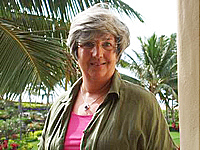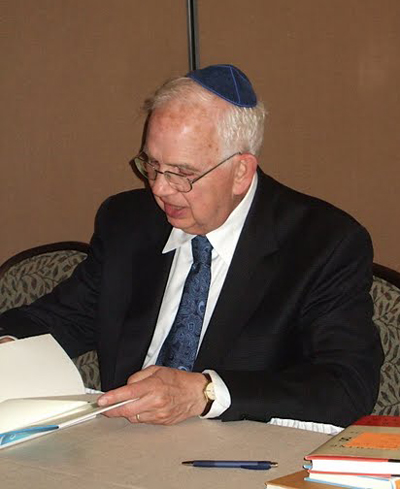|
By Gail Feinstein Forman
 CARDIFF BY THE SEA, California —Rabbi Harold Kushner opened the San Diego Jewish Book Festival on October 19 with a lecture on his newly-released book, Conquering F ear: Living Boldly in an Uncertain World. CARDIFF BY THE SEA, California —Rabbi Harold Kushner opened the San Diego Jewish Book Festival on October 19 with a lecture on his newly-released book, Conquering F ear: Living Boldly in an Uncertain World.
Well-known for his inspirational, best-seller books ( e.g., When Bad Things Happen to Good People, When All You Ever Wanted Isn’t Enough) offering practical advice and spiritual guidance dealing with life’s dilemmas, Kushner writes within both a Jewish and ecumenical framework.
Speaking in a straightforward and engaging manner at Temple Solel, Kushner acknowledged that we live in difficult times, with terrorism seemingly at our door, and with fear of job loss, fear of aging, and fear of rejection, individuals frequently feel that their lives and current events are out of control, thus engendering a chronic anxiety, and unease.
Rather than turning to God to take away our fear or to ameliorate the sources of our fear, Kushner laid out a humanistic theological interpretation that de-emphasizes the role of a personal God who directs all things.
Declaring, “God is moral-Nature is not,” Kushner urges his readers and listeners to regard God as a source of inspiration and strength rather than the Grand Designer who has his hand in every detail of life.
In a follow-up example, Kushner related his experiences meeting with victims of Hurricane Katrina. When people asked him how God could have let that happen, he told them that God had not created the natural disaster.
God had inspired the people who risked their lives to take out rowboats and rescue people hanging on to logs and houses. Kushner quoted a nineteenth century Hassidic Rabbi and answered, “Human beings are God’s language.”
To help individuals master their fears, Kushner laid out three proscriptions contained in the Twenty-seventh Psalm. This psalm is added to the daily and nightly prayer services only at one time of the year-for the forty-day period before Yom Kippur and continuing through ten days after.
The psalm begins:
The Lord is my salvation; whom shall I fear?
The Lord is my strength of my life; of what shall I be afraid?
Though a host encamps against me, my heart will know no fear. (Psalm 27: I, 3)
As the psalm continues, the psalmist regards God as the source of light, salvation and courage.
Kushner interprets “light” to mean using light to enlighten—to find out all the information you need about an event that preoccupies you with fear, such as a surgery. He believes that you more you learn, the less you fear.
Continuing in that vein, Kushner recounted that through his fifty years as a clergyman, he had seen instances over and over where people who thought they could never handle or recover from terrible crises find the strength to go on. To Kushner, this is God shedding light on these people.
Go to the top of right column
|
|

Next, the psalmist lists “salvation” as the second support. Kushner remarked that in Judaism, salvation has a completely different meaning than in Christianity. Kushner interprets salvation in a more practical sense, such as being saved from drowning, or from the despair from losing a job, a new more promising one often appears.
Kushner advises that instead of asking God to “save you” in difficult times, pray for the strength that will help you cope with the situation.
Kushner believes that hope and courage, rather than fear, are the will of God. He suggests that fear may be ever present, but one should follow the advice of Eleanor Roosevelt to “do the thing you cannot do” and know that you are never alone because, Kushner says, God is with you.
A personal example of Kushner’s own approach to managing fear was recounted during the Question and Answer period. On September 11, 2001, Kushner was on board an American Airlines flight in Boston, waiting for the plane to take off to go to a book tour in New York.
At that exact time, the Twin Towers were being hit. Passengers on board the plane had no information about the event, but were ultimately asked to leave the plane and not plan to fly for the rest of the day.
Kushner found out what had happened when he made a cell phone call to his publicist. His publicist mentioned to Kushner that she would understand if he didn’t want to fly to New York in the near future because of the fear of another terrorist episode.
While recognizing the danger involved, Kushner replied that he would be doing just what the terrorists wanted and that he would be on a plane to New York as soon as they started to fly again.
Kushner uses this example to suggest not turning away from life and its challenges with fear, but to use your own inner resources and strength from God. Appreciate the blessings that life affords and ask God through prayer for the strength to bear or overcome adversity.
And when choices need to be made, “Choose life so that ye may live.
|

